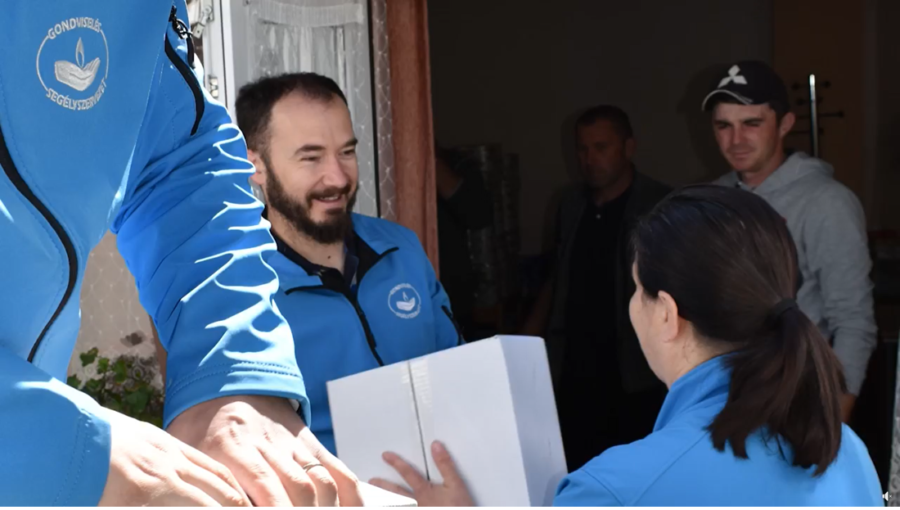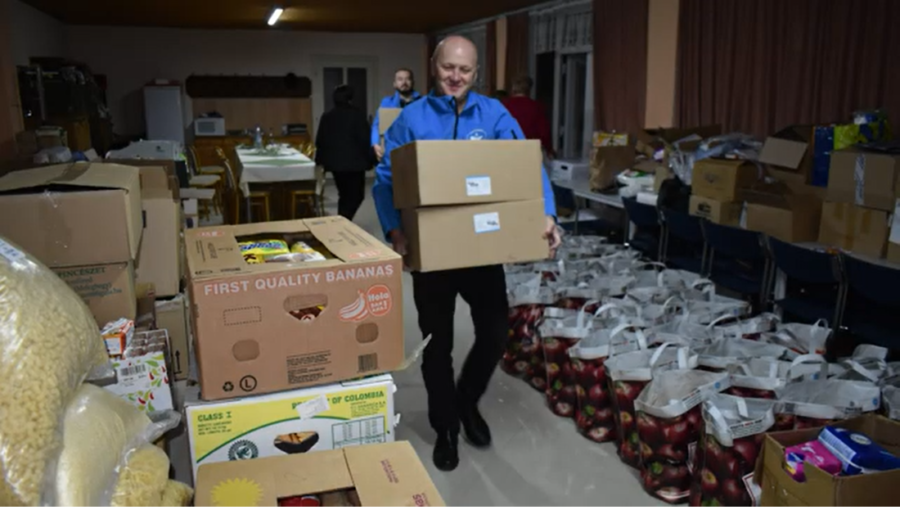Religions for Peace Multi-Religious Humanitarian Fund Supports Refugees and Internally Displaced Peoples from Ukraine
“Our neighbours are in need. How could we ignore their cries for help?” A member of the Hungarian Unitarian Church says as they pack humanitarian relief goods to deliver to refugees who had reached Transcarpathia, Hungary after feeling from the conflict in Ukraine. The Hungarian Unitarian Church is one among the 37 recipients of Religions for Peace Multi-Religious Humanitarian Fund (MRHF or “the Fund”).[1]
“We are seeing people who have been forced out of their homes and separated from their families and friends. We might not be able to remove that pain, but we can at least try to give them the dignity of a place to sleep and for their children to safely learn,” Szabó László, leader of the Asociatia Gondviselés Segélyszervezet, stated, while watching the children draw in the kindergarten day care.
Witness and solidarity
Bearing witness to the suffering and immediate needs of their neighbours, Asociația Gondviselés Segélyszervezet, the charity organisation of the Hungarian Unitarian Church in Romania, partnered with local religious and faith communities to mobilise a humanitarian response that continues to ease the suffering of several Ukrainian refugees in Romania and IDPs within Ukraine.
With the support of Religions for Peace, through its flagship Multi-Religious Humanitarian Fund, Asociația Gondviselés Segélyszervezet has provided safe shelter to 70 refugees, facilitated continued learning for 25 children, and directly delivered lifesaving humanitarian aid to refugee shelters in the regions of Transcarpathia and Odessa. Through the seed grant from Religions for Peace, the project fosters a culture of collaboration among local religious communities, which allows them to continue serving together in the mobilisation of humanitarian assistance to refugees and IDPs within and beyond Romania and Ukraine.

“When we heard that the war began in our neighbouring country, our first thought was that we needed to prepare our free apartments to accommodate those fleeing harm’s way,” a representative of Asociația Gondviselés Segélyszervezetreported. “With the help of families belonging to the parental community of the János Zsigmond Unitarian High School, we are providing safe housing and free meals for more than 70 refugees in the town of Cluj-Napoca (Kolozsvár), Romania. We also have educational and cultural activities for both adults and children in the shelter.”
A safe space for children
When the religious leaders from Asociația Gondviselés Segélyszervezet first started to welcome refugees into the shelter, they observed an urgent need for a daycare where mothers can safely leave their children while they worked. To this end, the project organised a daycare and kindergarten under two teachers who are also Ukrainian refugees. Currently, the kindergarten offers continued learning and socialisation for 25 children – bringing together children from across Ukraine (Odessa, Mariupol, Mikolajiv, Dnipr, Kiev, etc.) in a space that is safe and conducive to learning, playing, building friendships.
Furthermore, the project enabled the direct delivery of seven aid shipments to Transcarpathia, where Asociația Gondviselés Segélyszervezet worked with the Reformed (Calvinist) Church of Transcarpathia. Throughout several months, the two organisations delivered lifesaving humanitarian aid to refugee shelters, including non-perishable food, electric power generators, essential vitamins, medicines, sanitary and hygiene products, candles, sleeping bags, warm clothing, and other essential supplies.

From refugees to humanitarian service providers
The project is consistently working with the refugees and providing those who arrived earlier an opportunity to serve and volunteer to welcome new refugees. With the help of the refugees hosted by the organisation, the project also continues to provide direct aid to hospitals in Odessa, Ljubasevka, and Mikolajiv. The first family that received safe housing through the project has become one of the most active volunteers in the delivery of humanitarian aid. As a vital first step, the family contacted hospital managers in the three regions to identify their most pressing needs.
“We have been able to volunteer and support, Asociația Gondviselés Segélyszervezet to transport and deliver humanitarian aid to hospitals, including a hospital that was bombed in Mikolajiv, and provided technical equipment to a hospital that serves the whole region on Ljubasevka. I feel dignified and glad to be able to help” shared one volunteer.
The Fund in service of the most vulnerable
In a letter of gratitude to Religions for Peace and the Hungarian Unitarian Church, a representative of the Transcarpathian Calvinist Church expressed their appreciation for the delivery of lifesaving humanitarian aid to the most vulnerable refugees and IDPs in Ukraine, “It is uplifting for us that we always find open ears in solving our problems [in tasks]. Our Diaconal Department is in constant contact with local authorities, refugee centres and all our churches in Transcarpathia. Our ministers stay in their places, they persevere. Almost every church has refugees. Based on the information and requests we receive, we [continue] to help them with non-perishable food, cleaning supplies, whatever they ask for…”
Moreover, the management of the hospital in Mikolajiv published a letter of gratitude confirming the arrival of the humanitarian relief goods, “The hospital is currently being repaired and cleaned up after the terrible destruction… There is still a long way to go before it is fully restored, but we are working on it, and the Hungarian people are helping us. We are sincerely grateful for the support to the people of Ukraine, and we hope that one day we will be able to welcome them as guests in the peaceful city of ships!”
In 2022, the United Nations Refugee Agency (UNHCR) reported that the conflict in Ukraine had internally displaced over 6 million people and has caused another 8 million to flee to neighbouring countries in the region, including Hungary. To this day, the conflict has continued to cause widespread death, displacement, and destruction of homes, businesses, and essential infrastructure across Ukraine. The life-threatening humanitarian emergency is exacerbated by disruptions in access to water, electricity, food, heating, healthcare, education, social protection, and other essential services. While it is estimated that over 17 million people need emergency aid, humanitarian efforts have been limited due to the security threat posed by the ongoing armed conflict, and many are unable to access the aid that they desperately need.
Religions for Peace continues to play an integral role in ensuring that religious and faith communities like the Hungarian Unitarian Church are equipped to continue catalysing multi-religious collaboration and action in service of IDPs, refugees, children, and the most vulnerable populations within and beyond Europe.
The work of organisations like Asociația Gondviselés Segélyszervezet has a great and lasting impact on the lives of the most vulnerable populations. Through the Multi-Religious Humanitarian Fund, Religions for Peace supports interfaith initiatives that provide direct lifesaving assistance to millions of people who are affected by conflict and other global crises.
We ask that you consider giving a gift to the Religions for Peace Multi-Religious Humanitarian Fund today, so that we may continue supporting interfaith initiatives that deliver lifesaving humanitarian assistance where the needs are greatest.
[1] Since March 2020, Religions for Peace has supported multi-religious collaboration and action in service of the most vulnerable populations across the globe through its flagship Multi-Religious Humanitarian Fund (MRHF or “the Fund”). In its third phase, the Fund continues to support interfaith initiatives that deliver lifesaving humanitarian initiatives to those most affected by humanitarian emergencies, including refugees and internally displaced peoples (IDPs).